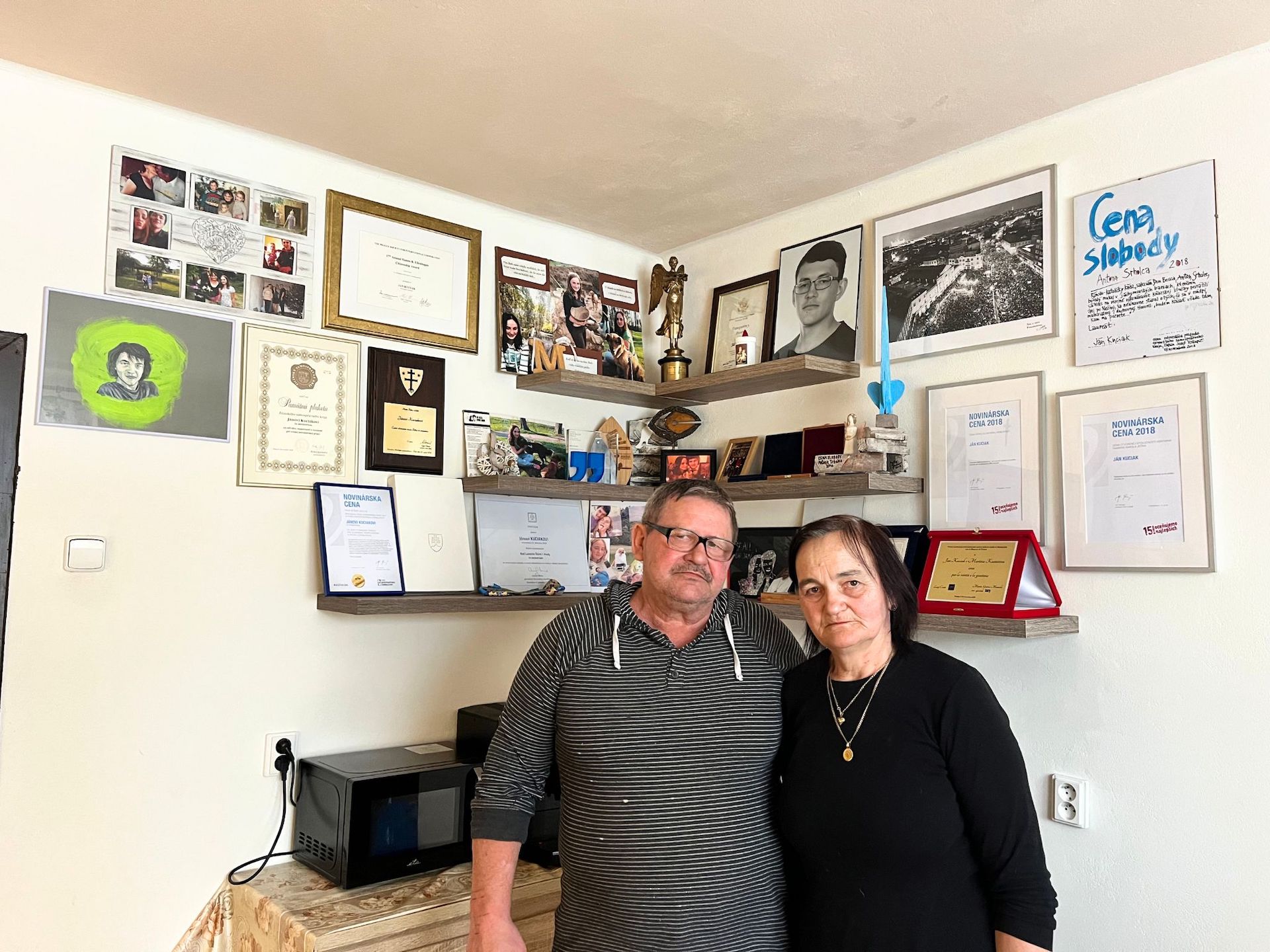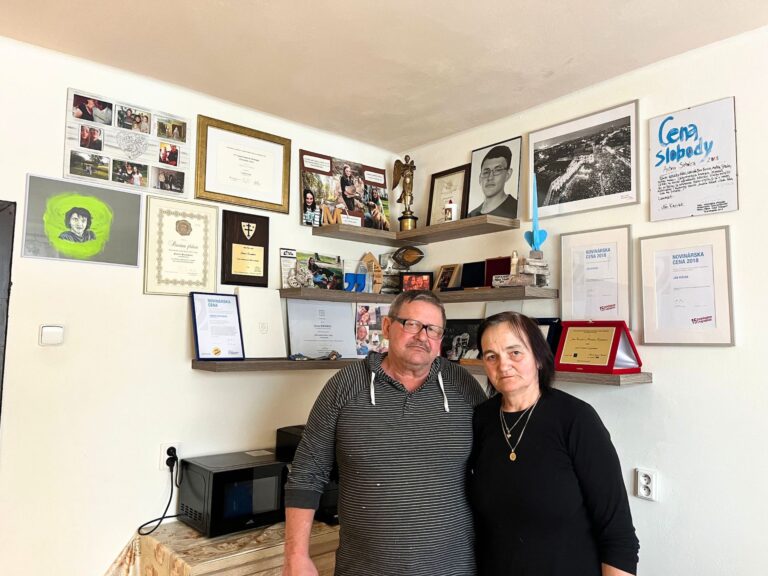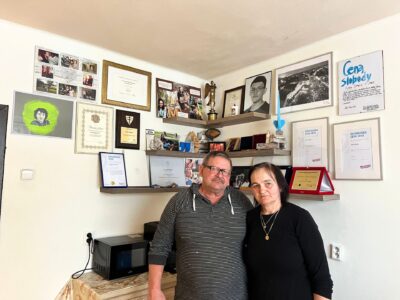For Jana and Jozef Kuciak, that day changed the world forever. As they say themselves, they had lived a simple, ordinary life before. Today, their faces are familiar to the whole of Slovakia, and it is not always pleasant. Nevertheless, they have never shied away from media interviews and still go to court hearings in Pezinok. Five years have passed since the murder of their son and his fiancée, but to this day the court has not made a final decision in the case of Marian Kočner and Alena Zsuzsová, accused of ordering the murder. The parents of Jan Kuciak also talk about how they are coping and how they perceive the changes that Slovakia has undergone in the last five years.
The original, Slovak version of this interview was published on icjk.sk
Five years have passed since the murders or Ján and Martina. What were those five years like for you?
Mr. Kuciak: It’s hard to describe. Everyone said that time would make things better and that time heals all wounds, but for us it’s still alive. No one will ever bring them back to us. Our lives have really been turned inside out. We were used to being home most of the time. Since I often travelled for work, I have been all over the former Czechoslovakia. So, we didn’t really go on holiday, to a spa at most. But now that’s changed. We travel more, and our life has changed overall. It’s also because people recognize us on the street. Sometimes it’s nice, sometimes it’s unpleasant. In short, our whole life has changed.
You lost your son and his fiancée. There truly are no words that could make this difficult period easier or describe it. Despite this, as you have said, you’ve never avoided media interviews. You have to travel a lot and you go to the hearings in Pezinok. Are you still managing?
Mr. Kuciak: It depends on how you look at it. Sometimes we’d prefer not to go, but I think that we owe it to them, and as long as it makes some sense, we’re going to be going there until the end. I hope there will be some sense to it. It’s all about what we can do for them now.
Mrs. Kuciaková: And it’s the last thing we’re going to get.
Mr. Kuciak: We go to the cemetery every day. When my younger son Jojko comes from work, he stops by for us, and we go and light that candle, day after day. There’s nothing else we can do.
How do you view the legacy of Ján’s work? When you look at it, do you see a legacy, in investigative journalism, in collaboration among journalists, in educating young people to have some hope, since he taught, too?
Mr. Kuciak: First of all, I would like to say they we viewed him first and foremost as a good person, a good son, and then as a journalist. And the fact that he did his job honestly and never intentionally hurt anyone, well, that should be a credo for other journalists. And journalists should realize that through cooperation and not just chasing after stories that they want to break first… Even though I know that now the publishers need to sell, so I understand that side of things, that they need to get the scoop. But investigative journalism should really be understood the way Janko wanted it to be. Cooperation. They really have to help each other out until they find something out. You can’t do anything by yourself. The more there are, the more they can do. That should be his legacy.
After Ján and Martina were murdered, people took to the streets. There was talk about cleaning up society, but in recent years that ethos has been sort of drowned out by the pandemic and now the war in Ukraine. The politicians who had a lot to say about that are now dealing with other things. According to you, what kind of shifts have happened in society over those five years? Or to put it another way, do you have the feeling at all that there has been some shift or that some shift is taking place?
Mr. Kuciak: Well, I know that people already see things a bit differently. You can feel it. But otherwise, that doesn’t really surprise me much. That’s the way it usually is in Slovakia, when you consider all such turning points, whether it was the Velvet Revolution, or the senseless death of two young people, or the war in Ukraine. In each case, the first rising up of society was when people . . . went together into things, but then [the enthusiasm] gradually wore off and all kinds of trolls who write nothing but fake news began to have the upper hand. And when I see it… Most recently it can be seen with aid for Ukraine. Before, everyone wanted to contribute something, and now it’s gone so far that some claim that Ukrainians came here to make trouble. They fled war, and now they are thought of as… the same way [refugees] were viewed right before the murders, in 2017, 2018, when the migrant crisis began, in Syria and mostly the Middle East. Now, people are beginning to have the same attitudes toward Ukrainian refugees.
Do you think that the protests and that Slovak society was capable of so forcefully condemning the murders of Ján and Martina brought positive changes to Slovak politics?
Mr. Kuciak: It’s hard for me to say anything about politicians, mainly because many politicians have greatly disappointed me. There are a few exceptions there. That’s the way it is in our country. A politician says only what people want to hear. And now they want to hear something else, so that’s what the politicians serve them up. That’s a constant thing. Really, it’s an old truth going back to Roman times: divide and conquer. They need to create division in society so that people are fighting with each other, sometimes entire families, so that they can control them better. I have a very bad opinion about politics, at least about our politics. In our country we are just learning democracy. If you take democracy in the developed Western countries, they went through a certain development, and our democracy must go through it too. There’s no other way. The way it is now, take freedom of speech. Some people have the idea that they can do anything. And they don’t have any moral, and actually any legal, boundaries for what is permitted and what isn’t. We have to learn all this. That’s my opinion anyway.
When you answered my first question, you said that now things are different because people sometimes recognize you on the street and that sometimes it’s nice and sometimes it’s not. At first, people must have displayed their sympathies, solidarity, empathy. But surely there were people who were heartless. What is it like today? Are there more people who are still empathetic, or do you have more negative experiences?
Mr. Kuciak: Well, personally, I don’t have many negative experiences. That’s more Zlatka. She’s encountered all kinds of things. But me, and it’s because I don’t go on Facebook and don’t take part in what I think are senseless arguments there, usually when someone approaches me it’s usually to wish their condolences or something. I haven’t met with any purely negative reactions.
After that terrible event of February five years ago people in general in society, and we as journalists have felt it, have “become more moral,” including politicians. There were fewer attacks on journalists. It became a sort of taboo to say the things that some government politicians said before about “anti-Slovak prostitutes” and so on. What do you think about the fact that these old ways seemed to have returned today? That people and politicians are no longer ashamed to attack journalists?
Mr. Kuciak: This is something I absolutely do not understand, even though I’ve talked to such people. I’ve met people who don’t want mainstream media at all. Facebook is enough for them. I don’t know. The basic logic clearly says that newspapers or media like television, they have to write the truth because otherwise they can be prosecuted for it. Everyone has the right to file a criminal complaint against them. But that doesn’t go for Facebook. So, when everyone can logically assess the situation, where is the truth? But unfortunately, that’s the way it is. Those are the ones who are louder; they shout more. Here, whoever shouts louder is the rightest. Vulgarity and swearing, some people are really tempted by that. Especially now, in this period, when across Europe and around the world it seems as if a new cold war has started. A battle between democracy and post-communist countries, [between] Putin’s Russia and America. And some people still have it ingrained in their heads that the main culprits behind everything are Americans. And politicians take advantage of that, at least Fico and company. And [some people say our] president, she’s an American agent. I even once heard that Janko had contacts with the secret service and God’s know what else. So, when they slowly sow the seeds among people, chaos grows out of it. Especially hatred between people.
It has been five years already, but as of yet not everyone that the investigators have identified as perpetrators have been convicted. How do you view this still ongoing trial?
Mr. Kuciak: It’s like this, that the actual murderer confessed and the middleman Andruskó. Well, the main mastermind behind the murder, he still thinks he’ll get off. He’s doing everything he can to. And when we think about it, I have to go back to Threema and to his business practices. First of all, he collected compromising materials about influential people to blackmail them, whether it was through Zsuzsová, or by looking into police databases, or surveillance. And he still has some of those materials. So, there are still quite a few people who can be blackmailed, and he will likely blackmail them. Therefore, we can’t really be sure that this will all end with his conviction. I’m curious what the verdict will be. But in any case, if they don’t convict him, we will appeal again, but that will draw it out again. I saw some statistics about Italy and other European countries. When mafia bosses with X number of murders on their conscious were convicted, they were usually convicted for economic crimes. Rarely for murders, because they are hard to prove when there are two or three middlemen involved. So, that’s the other side of things. But we’ll see. We hope it will finally end and justice will prevail.
And do you trust the Slovak justice system, the police, and the state prosecutor? Do you think that this cleaning up of society [that you spoke about] had some effect there or not?
Mr. Kuciak: Well, I can say that now the police have been given free hand, but then again. I put my hopes in a restructuring of the judiciary. Here, it’s mainly about the courts. That there will be a new court map, that those factions that were and still are in some courts will be broken up. But judicial reform ended up how it ended up, and nothing happened, and those same people are still there. That’s the way normal, ordinary people see it. I know a person who got a law degree with honors, and she wanted to get a job. She didn’t want to be a lawyer but a senior court clerk. But that’s a problem because the niece of that judge or the nephew of that judge is already there. And everything is patterned like this. And if this doesn’t get changed, if people who can and want to do it and want to work honestly can’t get these positions that they should get, then not much will change. The courts are close knit; everyone knows everyone. Usually, if a father is a judge, then one of his children becomes a judge; that’s the way it goes. Well, there are good ones, too. I’m not going to say there aren’t, but my overall impression is that everything is so intertwined. Mainly, since we witnessed something that is hard to believe, but unfortunately that’s the way it is, and every reasonable person must admit that that gang made its way into the Office of the Government and was there, and the police were more or less directed by members of this “mafia.”
Mrs. Kuciaková, do you believe in justice? That you will get justice in this case?
Mrs. Kuciaková: I want to believe that in April, it will be all over. They’ve presented some more evidence, but it all depends on whether the judge will accept it or not.
How do you see those three who have already been convicted? I mean Szabó, Marček, and Andruskó. Marček and Andruskó cooperated with the investigators. They gave testimony in court. On one hand, they helped clear up the whole case, but for that they received lower punishments. How do you feel about that? Do you think these punishments, even though they helped, are enough?
Mr. Kuciak: It’s hard to say what is a sufficient punishment and what isn’t. Maybe a psychologist or psychiatrist could say whether it’s possible for such a person to be reformed. About those confessions, … what are my impressions of those three people. It was described best by Szabó’s friend, who helped them . . . That Szabó wanted to make a name for himself at all costs, he wanted to be someone, prove something. That’s why he joined the police, that’s why he ended as an armed guard on ships. And to kill another person wasn’t a problem for him, because things like that happened there. Marček is the same. But Marček was at least at a little lower mental level than Szabó. So, from the beginning Szabó pointlessly excused himself by saying he was afraid of Marček, that everything was Marček’s fault. But Marček was just a simple killer, and most likely, emotionless. Well, his testimony, when he talked about it, it was like he was describing some kind of… Well, he confessed to it. It’s clear it was them. That’s why I don’t know why other versions are still floating around when it’s clear that it’s this group that’s before the court now.
Have they ever tried to contact you? They said in court that they are sorry and begged for your forgiveness. Do you believe they are sorry?
Mr. Kuciak: We got a letter. First from Andruskó and then… I can’t comment on it yet. It’s not closed yet, and I didn’t have the feeling that they somehow regretted it. Especially Szabó, who for a long time feigned innocence… and…
Mrs. Kuciaková: Something like that can’t be forgiven. It’s something that no one can give you back, that no one can replace. Simply, if someone took something from me and gave it back, that’s different. But this they’ll never undo. No one can ever undo this. It just can’t be forgiven.
 Support independent investigative journalism in Slovakia,
Support independent investigative journalism in Slovakia,
you can donate here.
Tomáš Madleňák is a Slovak journalist who has worked for the Investigative Center of Ján Kuciak since 2020. He is based in Bratislava.







